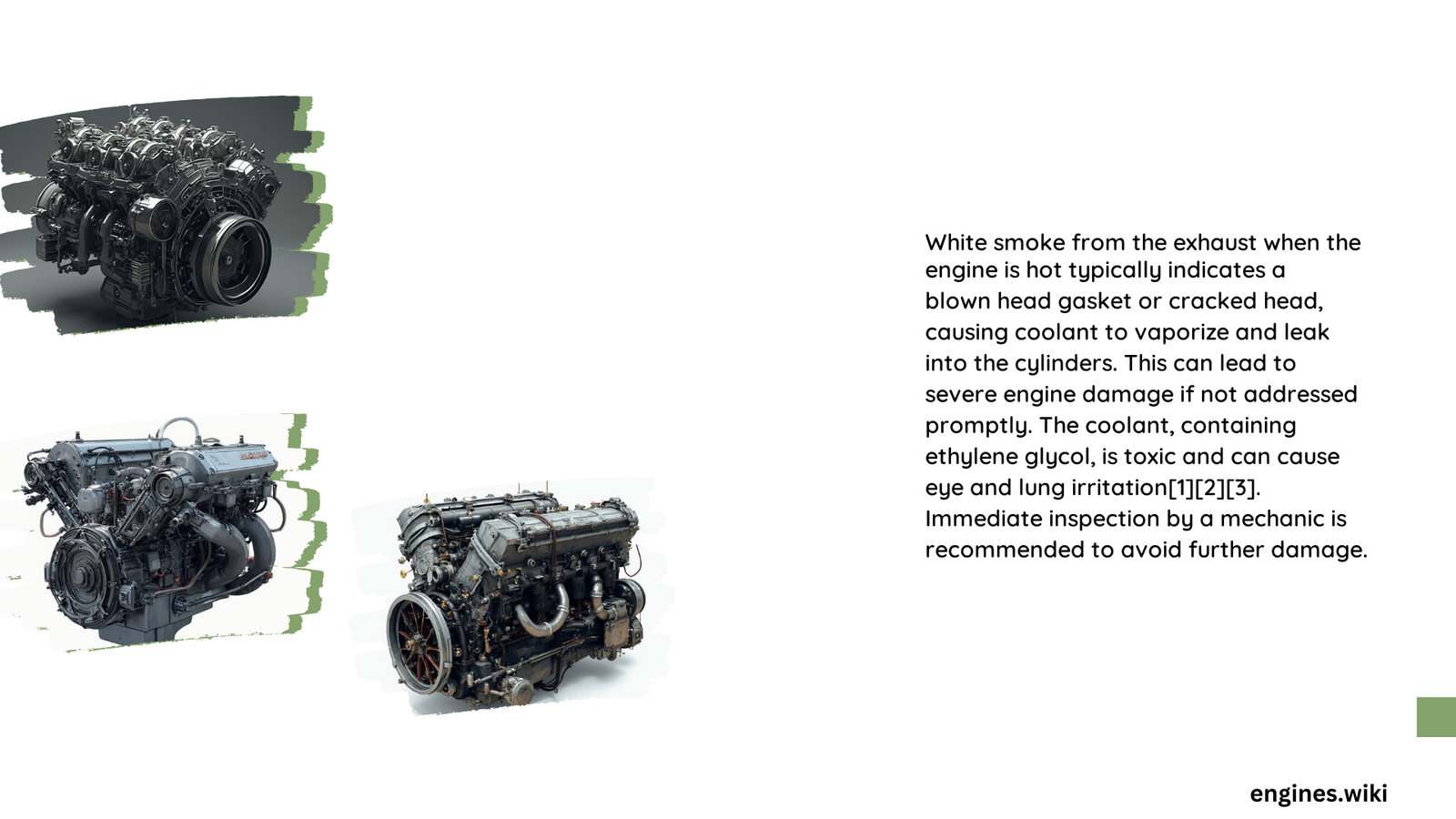When a car smokes when the engine is hot, it’s often a sign of underlying issues that require immediate attention. This problem can stem from various sources, including coolant leaks, oil leaks, engine overheating, or fuel system malfunctions. The color and consistency of the smoke can provide valuable clues about the root cause. Understanding these symptoms and their implications is crucial for maintaining your vehicle’s health and preventing costly repairs.
What Causes a Car to Smoke When the Engine is Hot?
The primary causes of a car smoking when the engine is hot include:
- Coolant leaks
- Oil leaks
- Engine overheating
- Fuel system issues
Let’s delve deeper into each of these causes and their associated symptoms.
Why Does White Smoke Come from My Exhaust When the Engine is Hot?
White smoke from the exhaust when the engine is hot often indicates a coolant leak. This occurs when coolant enters the combustion chambers, typically due to:
- A blown head gasket
- A cracked cylinder head
- A cracked engine block
Symptoms:
– Thick, white smoke billowing from the exhaust pipe
– Sweet smell (similar to butterscotch or maple syrup) due to the ethylene glycol in the coolant
– Engine overheating
Danger Level: High. Immediate attention is required to prevent further engine damage.
What Does Blue or Grey Smoke from the Exhaust Mean?
Blue or grey smoke from the exhaust typically indicates an oil leak. This happens when engine oil enters the combustion chamber, often due to:
- Worn piston rings
- Leaking valve seals
- A faulty PCV valve
- Excessive oil in the engine
- A faulty turbo seal in turbocharged engines
Symptoms:
– Blue or grey smoke from the exhaust pipe
– Misfiring engine
– Increased vehicle shaking when idle
Danger Level: Elevated. Ignoring this issue can lead to significant engine damage and oil depletion.
How Does Engine Overheating Cause Smoke?
Engine overheating can cause white smoke or steam from the exhaust. This is often due to malfunctions in the cooling system, such as:
- A faulty thermostat
- Low coolant levels
- A clogged radiator
Symptoms:
– White smoke or steam from the exhaust pipe (thin and disappearing after engine warm-up if it’s just condensation)
– Persistent white smoke indicates a more serious issue like a coolant leak
Danger Level: High if it’s not just condensation. Immediate attention is required to prevent engine damage.
What Causes Black Smoke from the Exhaust When the Engine is Hot?
Black smoke from the exhaust when the engine is hot typically indicates a rich fuel-air mixture. This can be caused by:
- Clogged fuel injectors
- A dirty engine air filter
- A faulty fuel pressure regulator
- A dysfunctional carburetor in older cars
Symptoms:
– Black smoke from the exhaust pipe
– Engine misfiring or shaking when idle
Danger Level: Medium. While it doesn’t pose an immediate danger, it can lead to increased emissions and decreased fuel efficiency.
How Can I Diagnose the Cause of Smoke When My Engine is Hot?

Diagnosing the cause of smoke when your engine is hot involves several steps:
- Observe the smoke color:
- White: Likely coolant leak
- Blue/Grey: Likely oil leak
-
Black: Likely fuel system issue
-
Check engine temperature:
- Normal: 195°F to 220°F (90°C to 104°C)
-
Overheating: Above 230°F (110°C)
-
Inspect oil levels and condition:
- Check for low oil levels or unusual consistency
-
Look for oil spots under the car
-
Monitor coolant levels:
- Check for low coolant levels
-
Look for coolant leaks around the engine
-
Examine the air filter:
-
A dirty air filter can cause black smoke
-
Use diagnostic tools:
- OBD-II scanner can provide valuable information about engine performance
What Are the Repair Costs for a Car That Smokes When the Engine is Hot?
Repair costs can vary widely depending on the cause of the smoke:
| Issue | Estimated Repair Cost |
|---|---|
| Coolant Leak (e.g., blown head gasket) | $1,000 – $5,000+ |
| Oil Leak (e.g., worn piston rings) | $500 – $2,000 |
| Engine Overheating (e.g., thermostat replacement) | $200 – $1,000 |
| Fuel System Issues (e.g., clogged injectors) | $200 – $1,000 |
How Can I Prevent My Car from Smoking When the Engine is Hot?
To prevent your car from smoking when the engine is hot:
- Regular Maintenance:
- Follow the manufacturer’s recommended maintenance schedule
- Change oil and filters regularly
-
Keep coolant levels topped up
-
Monitor Engine Temperature:
- Pay attention to the temperature gauge
-
Address any overheating issues promptly
-
Address Small Issues Quickly:
- Don’t ignore minor leaks or unusual sounds
-
Regular inspections can catch problems early
-
Use Quality Parts and Fluids:
- Use manufacturer-recommended or high-quality aftermarket parts
-
Use the correct grade of oil and coolant for your vehicle
-
Drive Responsibly:
- Avoid aggressive driving, which can strain engine components
- Allow the engine to warm up properly in cold weather
By following these preventive measures and addressing any issues promptly, you can significantly reduce the likelihood of your car smoking when the engine is hot and extend the life of your vehicle.
Remember, if you notice smoke coming from your car when the engine is hot, it’s crucial to diagnose and address the issue promptly to prevent more severe and costly damage to your vehicle.
